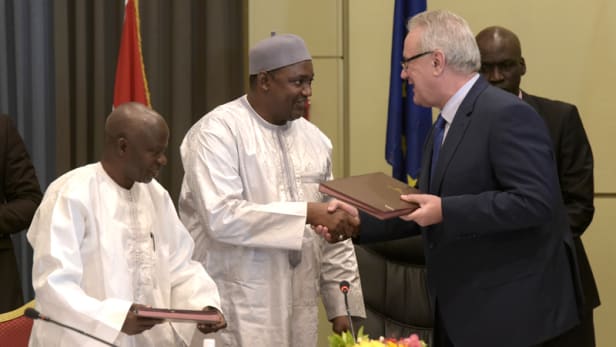By Molly Anders
 |
| Gambian Foreign Affairs Minister Ousainou Darboe, President of The Gambia Adama Barrow, and European Development Commissioner Neven Mimica during a bilateral ceremony. Photo by: European Union |
European Commissioner for International Cooperation and Development Neven Mimica yesterday signed a 75 million euros pledge of support to The Gambia with its newly elected President Adama Barrow, putting an end to a four-year freeze on all aid from the European Commission implemented by Barrow’s predecessor.
The support comes into effect immediately and will be followed by another package as early as summer 2017, Mimica told Devex, amounting to an unprecedented 150 million euros of new support, in addition to unlocking 60 million euros in previously frozen aid for the 2016-2020 funding cycle.
The move is another stark departure from the policies of Barrow’s now-exiled predecessor, Yahya Jammeh. Barrow pledged last week to “rejoin the international community” and accept assistance from multilateral organizations, including the EU, the United Nations, the African Union and the Commonwealth, “because these are the partners that Gambia needs,” Barrow said at a press conference in Banjul on Thursday.
“If we are isolated, it will be very difficult for us to develop this country, and we are calling on everybody — the United Nations, the African Union, the European Union and everybody — to come on board to support this young democracy.”
The Gambia is the smallest country in Africa but is the source of the second highest number of migrants to Europe relative to its size. Mimica, European commissioner for International Cooperation and Development, will be hoping that aid assistance can help to stem the flow of migrants as part of his controversial EU Emergency Trust Fund for Africa, an aid fund focused on tackling the causes of migration.
Development cooperation from what Jammeh referred to as “neo-colonial institutions” was frozen in 2013. Now, Barrow’s embrace of the international community offers an opening for Mimica, who is under pressure to demonstrate results for the fund and has drawn criticism for incorporating border security measures and migrant repatriation into it.
“The Gambian Youth Empowerment Scheme aims to benefit directly and indirectly about 100,000 young people. The project aims at reaching the huge gap between the demand for work and the offer,” Mimica said in a press conference launching the Youth Empowerment Fund, supported by the Emergency Trust Fund and in partnership with the International Trade Centre.
“As well as private investment promotion in The Gambia, I would like to highlight the importance of mapping the various bottlenecks to job creation,” he said. “This initiative… will also give the opportunity to restore hope for members of the diaspora and Gambians who migrated abroad.”
Mimica told Devex that in his meeting with the new president, Barrow showed “general openness” to the prospect of repatriation schemes for Gambians abroad.
“A program aiming at supporting the economic reintegration of migrants will be launched very soon,” he said.
Until 2016, the EU’s total contribution to The Gambia remained frozen at 60 million euros per funding cycle, mostly in infrastructure. According to a commission statement, the new funding includes:
• 11 million euros to reinforce access for vulnerable populations, including households led by women, to markets and socioeconomic facilities
• 20 million euros to create job opportunities, particularly for young people, and a further 11.5 million euros through the Emergency Trust Fund dedicated to creating jobs for youth
• 11.5 million euros will go to food security through the provision of food, cash, treatment of acute malnutrition and prevention of undernutrition
• 21 million euros is dedicated to climate change, food security, support of civil society, democracy and human rights, among other issues
Mimica also confirmed that the commission is preparing a tranche of budget support as part of the next 75 million euros installment, signaling a vote of confidence in the two-week-old regime’s capacity to govern and stave off corruption.
Barrow has imposed a three-year deadline on his administration to demonstrate real change. His priority, he said, is rebuilding the economy.
“We want to create jobs for youth to remain in the country,” Barrow said in a response to a question from Devex. “To create those jobs, we are talking about investing in light industries and efficient industries.”
“Our agenda remains to reform and transform this country, so that our people can live in dignity,” he added.
Asked how Barrow might tackle the economy in a way that will demonstrate results within his self-imposed three-year deadline, Arancha González, director of the International Trade Centre, told Devex that Barrow “will have to go after the low-hanging fruit.” That will include improving trade links within current industry value chains, for example, by connecting The Gambia’s production of fruit, vegetables and nuts to the country’s burgeoning tourist industry.

No comments:
Post a Comment